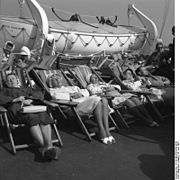- Deckchair
-
On-deck image of passengers on RMS Carpathia during a 1914 overseas tour led by Father Blasius Zeiser

A deckchair is a folding chair, usually with a frame of treated wood or artificial material (for protection against the weather) and a fabric or vinyl backrest and seat. It may have an extended seat, meant to be used as a leg rest, whose height may be adjustable. It may also have arm rests.
It is meant for leisure, originally on a big cruise ship's deck, which explains the origin of its name. It is easily transportable and stackable, although notouriously difficult to unfold and fold up to put away. The classic deckchair can only be locked in one position. Later, the strips of wood going toward the back were lengthened and equipped with supports so that there were several possible sitting positions. A removable footrest can also add to the comfort of the user.
There are often deckchairs around the pools of hotels and they are coveted by the guests. Since there are not enough places for everyone interested in a deckchair, they are marked as occupied by the placement of a personal article, usually a towel, already in the early morning, even though the user does not show up until much later.[1]
During the golden age of ocean liner travel, the deckchairs upon actual ships' decks were sometimes reserved for particular passengers for whom crew would attach a paperboard name tag to the wicker seat-back. Such a tag is visible on an empty deckchair near the center in a famous 1912 photo showing survivors of the RMS Titanic disaster after rescue while they rest on the deck of RMS Carpathia.[2][3] The same system was in use aboard Carpathia two years later; a reservation tag is visible on the empty deckchair in the lower right of a 1914 photo.
The available deckchair models range from simple wooden constructions to luxury models with electrically adjustable seating positions.
Usage
To "rearrange the deck chairs" is a popular saying meaning that things have changed only apparently. The phrase, "rearrange the deck chairs on the Titanic" amplifies on it by implying that someone is overly concerned with unimportant minutiae during a crisis.
See also
References
- This article incorporates information from the revision as of January 9, 2008 of the equivalent article on the German Wikipedia.

This article about furniture or furnishing is a stub. You can help Wikipedia by expanding it.



